3 downloads
Title of document: Management of Cropping Pattern Authors: Daw Khin Mar Yee Journal’s name if any: Ministry/Government Agency/Organisation: Ministry of Agriculture and Irrigation Department of Agriculture Agricultural Extension and Education Division Year of publication: Geographic focus: Myanmar Main issues / topics addressed (for example: Land Utilization in Myanmar, Current Crops management, Crops Management for Nyaung Oo Trowship……) School of agroecology (if any): Web address to original document (if any): Summary: Inter-cropping Pattern is much more better than Sole Cropping Pattern to reduce crop losses due to yearly drought Presentation talking about Management of Cropping Pattern in NyaungOo Township in dry zone area Read More
3 downloads
Title of document: Farming Practices Applied in Welthungerhilfe-Lashio Contributing to Sustainable Agriculture Authors: U Thein Su Journal’s name if any: Ministry/Government Agency/Organisation: Year of publication: Geographic focus: Myanmar Main issues / topics addressed (for example: Sustainable agriculture, Sustainable farms, Conservation Agriculture, Sloping Land Management practice ……) School of agroecology (if any): Web address to original document (if any): Summary: Conservation Agriculture to be together with high and sustained production levels Presentation of Farming Practices Applied in Welthungerhilfe-Lashio Contributing to Sustainable Agriculture, Myanmar Read More
5 downloads
Title of document: Agroecology Approaches and Practices in Farmer Field School Authors: Khin Maung Latt Journal’s name if any: Ministry/Government Agency/Organisation: Metta Development Foundation Year of publication: 2016 Geographic focus: Myanmar Main issues / topics addressed (for example: FFS Area in Myanmar, System of Rice Intensification……) School of agroecology (if any): Web address to original document (if any): Summary: The Farmer Field School (FFS) approaches was set up as an extension model to build capacity of local farmers Presentation of Agroecology Approaches and Practices in Farmer Field School, on 7-8 March 2016, Myanmar Read More
5 downloads
Title of document: Proceedings of the regional workshop: Towards a regional initiative to develop E-learning resources in Agroecology - Phnom Penh, Cambodia, 11th of October 2017 Authors: Florent Tivet Ministry/Government Agency/Organisation: ACTAE/CIRAD_GRET Year of publication: 2017 Geographic focus: Mekong Region Summary: Based on on-going activities in the field of training and higher education implemented by a range of partners within ACTAE project and beyond (see program of the event) a regional workshop was organized in Phnom Penh on October 11 2017 bringing together different partners involved in training, awareness raising and higher education. This workshop was organized on the continuity of a 1st event organized by ALISEA in Vientiane in June 2017. A diversity of participants attend the event with representatives from several universities in the region (Thailand, Lao PDR, Cambodia, Myanmar), research institutions, representatives from Ministry of Agriculture, departments of Agricultural Land Resources Management, and NGOs. The first focus of the event was on e-learning as an integrated tool between different actors and beneficiaries. Discussions were conducted prior the event one between ITC, SupAgro, RUA, Queensland University, GDA/DALRM, GRET and CIRAD to identify common expectations for this event and outputs. Read More
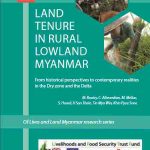
2 downloads
Title of document: Land tenure in rural lowland Myanmar: From historical perspectives to contemporary realities in the Dry zone and the Delta_Myanmar version Authors: M. Boutry, C. Allaverdian, M. Mellac, S. Huard, U San Thein, Tin Myo Win, Khin Pyae Sone Ministry/Government Agency/Organisation: GRET Year of publication: 2017 Geographic focus: Myanmar Summary: During the critical years following the 2012 land reforms undertaken in the midst of Myanmar’s political transition, Gret conducted an in-depth study combining qualitative and quantitative surveys in nine villages of Bogale and Mawlamyinegyun townships (Delta) and nine villages in Monywa and Yinmabin townships (Dry Zone). The full report and the synthesis are the result of more than two years in-depth research and 13 months of fieldwork that involved an inter-disciplinary team of 11 international and Myanmar researchers. It provides a better understanding of land dynamics at the local level and proposes a new reading of issues faced by rural households in these days of reform Read More
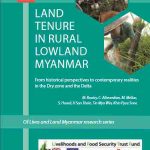
5 downloads
Title of document: Land tenure in rural lowland Myanmar: From historical perspectives to contemporary realities in the Dry zone and the Delta_EN version Authors: M. Boutry, C. Allaverdian, M. Mellac, S. Huard, U San Thein, Tin Myo Win, Khin Pyae Sone Ministry/Government Agency/Organisation: GRET Year of publication: 2017 Geographic focus: Myanmar Summary: During the critical years following the 2012 land reforms undertaken in the midst of Myanmar’s political transition, Gret conducted an in-depth study combining qualitative and quantitative surveys in nine villages of Bogale and Mawlamyinegyun townships (Delta) and nine villages in Monywa and Yinmabin townships (Dry Zone). The full report and the synthesis are the result of more than two years in-depth research and 13 months of fieldwork that involved an inter-disciplinary team of 11 international and Myanmar researchers. It provides a better understanding of land dynamics at the local level and proposes a new reading of issues faced by rural households in these days of reform Read More
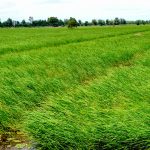
20 downloads
Title of document: Presentations from the Regional Forum on Promoting Sustainable Agriculture in the Mekong Sub-Region towards Food Security, An Giang University, Vietnam 6-7 November 2017 Authors: Ministry/Government Agency/Organisation: An Giang University, ALiSEA, SEARCA Year of publication: 2017 Geographic focus: Mekong Region Summary: The Mekong Sub-region is rapidly becoming a new frontier of economic growth in Southeast Asia due to its rich human and natural capital (ADB 2017). Its suitability for a wide range of crops has made agriculture one of the sub-region’s important economic sectors. It has also led to increased trade and investment linked to regional integration. More than two-thirds of the population of the countries comprising the Mekong Sub-region rely heavily on agriculture for their livelihoods (WWF Greater Mekong). These countries are Cambodia, the Lao People's Democratic Republic (Lao PDR), Myanmar, Thailand, and Vietnam. The People's Republic of China (Yunnan Province) is a part of this sub-region but for purposes of this forum is not included. The forum aimed to share research findings from SEARCA SFRT grantees across the Mekong Sub-Region, as well as develop research to address gaps, towards the promotion of ecological farming, adaptation to climate change, and improving rural livelihoods and food security. This forum covered Seed Fund for Research and Training (SFRT) research from 2013 to 2016 where 11 out of 15 studies of Vietnamese and Myanmar grantees are relevant to the above subject (none from Cambodia, Lao PDR, and Thailand for the period). The expected participants were selected local researchers from universities in Vietnam, particularly in the Mekong Delta, SFRT grantees and SEARCA Fellows/scholarship alumni from Cambodia, Lao PDR, Myanmar, Vietnam and Thailand. It also featured research conducted by the Research Center for Rural Development (RCRD) of An Giang University under the project component Agroecology Learning Alliance in South East Asia (ALiSEA). The ALiSEA component supports activities aimed at increasing visibility and credibility of the agroecology movement, and scaling up the development and adoption of agroecological practices among farmers. Here are the presentations of the Seed Fund for Research and Training (SFRT) research from 2013 to 2016: Assessment of Impacts of and Adaptation to CC in Fisheries and Agriculture - Mac Nhu Binh Assessment of the Impact of CC to Aquaculture Fisheries Household - NTHDiep Assessment of Traditional Rice Based Farming Systems - LT Phong Climate Change Impact on Rice Production and Adaptation - Huynh Viet Khai Enhancing Marketing Capacity for Agriculture Cooperatives - QTXuan Gender roles and relationship in water management - Nguye Van Thai Impact of Rural Out-migration on the Resilience of Agricultural - Seinn Seinn Mu Promoting Sustainable Agriculture in the Mekong Sub-Region_ Ngo Thanh Son Read More
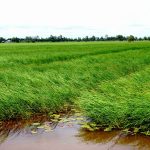
18 downloads
Title of document: Presentations from the Regional Forum on Promoting Sustainable Agriculture in the Mekong Sub-Region towards Food Security, An Giang University, Vietnam 6-7 November 2017 Authors: Ministry/Government Agency/Organisation: An Giang University, ALiSEA, SEARCA Year of publication: 2017 Geographic focus: Mekong Region Summary: The Mekong Sub-region is rapidly becoming a new frontier of economic growth in Southeast Asia due to its rich human and natural capital (ADB 2017). Its suitability for a wide range of crops has made agriculture one of the sub-region’s important economic sectors. It has also led to increased trade and investment linked to regional integration. More than two-thirds of the population of the countries comprising the Mekong Sub-region rely heavily on agriculture for their livelihoods (WWF Greater Mekong). These countries are Cambodia, the Lao People's Democratic Republic (Lao PDR), Myanmar, Thailand, and Vietnam. The People's Republic of China (Yunnan Province) is a part of this sub-region but for purposes of this forum is not included. The forum aimed to share research findings from SEARCA SFRT grantees across the Mekong Sub-Region, as well as develop research to address gaps, towards the promotion of ecological farming, adaptation to climate change, and improving rural livelihoods and food security. This forum covered Seed Fund for Research and Training (SFRT) research from 2013 to 2016 where 11 out of 15 studies of Vietnamese and Myanmar grantees are relevant to the above subject (none from Cambodia, Lao PDR, and Thailand for the period). The expected participants were selected local researchers from universities in Vietnam, particularly in the Mekong Delta, SFRT grantees and SEARCA Fellows/scholarship alumni from Cambodia, Lao PDR, Myanmar, Vietnam and Thailand. It also featured research conducted by the Research Center for Rural Development (RCRD) of An Giang University under the project component Agroecology Learning Alliance in South East Asia (ALiSEA). The ALiSEA component supports activities aimed at increasing visibility and credibility of the agroecology movement, and scaling up the development and adoption of agroecological practices among farmers. Here are the presentations of the plenary session: Development potentials for floating rice cultivation in Ayeyarwady Delta Region, Myanmar - Nilar Aung Integrating collaborative co-designed research and citizen sciences for conservation of floating rice in the Mekong Region, Vietnam - Dr. N V Kien Sarus crane, an indicator of sustainable agriculture in the Ayeyarwady Delta, Myanmar - Tran Triet Scoping Floating rice based agro-ecological farming system, Myanmar - Dr Thein Tun Trade-offs between ecosystems services in rice cropping system, Cambodia - Dr Malyne Neang Read More
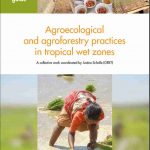
53 downloads
Title of document: Agroecological and agroforestry practices in tropical wet zones Authors: A collective work coordinated by Justine Scholle (GRET) Ministry/Government Agency/Organisation: GRET Year of publication: 2017 Geographic focus: Mekong Region and Central Africa Summary: This guide is designed as a support tool for technicians and farmers involved in actions to promote and develop agroecology. It is a follow-up to a first technical guide published in 2014 in the Democratic Republic of Congo as part of the DEFIV project, a food security project implemented by GRET, funded by the European Union and Agence française de développement. This guide features two parts: The first part presents the current context and issues of agroecology in tropical wet regions. Having demonstrated the limits of conventional agricultural systems, analysed the effects of deforestation, the green revolution and climate change, the authors specify the objectives and the principles of agroecology, and remind readers of the conditions necessary to promote it. The second part is very operational and covers the various agroecological techniques, which were tested in a tropical wet context with satisfying results in the Democratic Republic of Congo (DEFIV project), Cambodia (APICI project) and Myanmar (Delta and NRS projects). Firstly, the various agroecological techniques are presented, and secondly the plants used to implement these techniques are described. Naturally, techniques such as plant inventories mentioned in this guide are not exhaustive. Read More
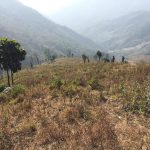
79 downloads
Case study's fact sheet: Agroforestry Alternatives to Shifting Cultivation in Upland Myanmar, Chin State Supported by: World Agroforestry Center East and Central Asia (ICRAF-ECA) In practice since: 2015 Geographic focus: Myanmar School of agroecology: Agroforestry >>> see on map Read More

 Asia & Mekong Region
Asia & Mekong Region  Cambodia
Cambodia  Laos
Laos  Myanmar
Myanmar  Other
Other  Vietnam
Vietnam